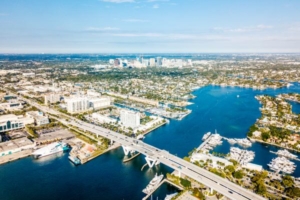Housing Market Uncertainty: 14.3% of Home Deals Falling Through in Early 2025
Homebuyers Getting Cold Feet: Purchase Cancellations Hit Eight-Year High
The American housing market is experiencing a significant shift as more homebuyers are backing out of purchase agreements than at any comparable time since record-keeping began in 2017. According to the latest market analysis, approximately 41,000 U.S. home-purchase agreements were canceled in January 2025, representing 14.3% of all homes that went under contract during that month. This marks a notable increase from the 13.4% cancellation rate observed in January 2024.
This trend is particularly pronounced in southeastern markets, with Atlanta leading the nation at a staggering 19.8% cancellation rate. Other markets experiencing high cancellation rates include Orlando (18.2%), Las Vegas (17.9%), Houston (17.8%), and Jacksonville (17.8%). The pattern suggests a fundamental shift in buyer behavior that merits closer examination.
Market Forces Driving the Cancellation Surge
Several interconnected factors are contributing to this unprecedented level of buyer hesitation:
1. Supply-Demand Imbalance
Housing inventory has reached its highest level since 2020, creating a scenario where buyers suddenly have more options. Simultaneously, pending home sales dropped to record lows in January (excluding the pandemic's early months). This combination has tilted the market in buyers' favor, emboldening them to be more selective and willing to cancel contracts if better opportunities arise.
"I'm witnessing more homebuyers backing out of deals than usual," notes Sam Brinton, a Premier agent in Salt Lake City. "Some buyers are developing cold feet given the current global uncertainties. However, despite the increased cancellations, buyer interest remains strong overall. Properties in prime locations continue to sell quickly, and those transactions are less likely to fall through."
2. Economic Volatility
Widespread economic and political uncertainty is playing a significant role in buyer psychology. Recent tariffs, corporate layoffs, and shifts in federal policy have created an atmosphere of instability that's causing both buyers and occasionally sellers to reconsider major financial commitments. This uncertainty is compelling many potential homeowners to maintain their current living situations rather than proceed with purchases.
3. Persistent Housing Affordability Challenges
Despite slight recent improvements, mortgage rates remain stubbornly high, with January's average hitting 6.96% – an eight-month peak. Combined with ongoing home price appreciation (median U.S. home prices rose 4.1%), the financial burden of homeownership continues to stretch many buyers' budgets beyond comfortable limits. When paired with economic uncertainty, these elevated costs are convincing some buyers to abandon their purchase plans altogether.
Regional Hotspots: Florida's Housing Market Under Pressure
Florida's real estate landscape deserves special attention, with multiple metropolitan areas ranking among those with the highest cancellation rates. The Sunshine State's housing market is experiencing a notable cooling period driven by:
- Increasing frequency of natural disasters
- Skyrocketing home insurance premiums
- Escalating HOA fees
- Record-high inventory levels
The abundance of available properties in Florida has fundamentally altered buyer behavior. Real estate professionals report that the surplus inventory has empowered buyers to be exceptionally selective. When inspection issues arise, many buyers are now opting to walk away rather than negotiate, knowing they can easily pivot to alternative properties without such concerns.
Wildfires and Real Estate: Los Angeles Cancellations Spike
Los Angeles experienced its highest January cancellation rate in eight years, with 15.9% of pending sales falling through (up from 13.2% last year). This 2.7 percentage point increase appears directly linked to the devastating Palisades and Eaton wildfires, which destroyed thousands of homes and severely disrupted daily life throughout Southern California.
The impact of natural disasters on real estate transactions highlights the increasingly important role that climate considerations play in housing market dynamics. As extreme weather events become more frequent, their influence on buyer behavior and regional market stability will likely grow more pronounced.
Market Stability: Where Deals Are Holding Strong
Not all markets are experiencing heightened cancellation rates. The San Francisco Bay Area demonstrates remarkable stability, with only 4.1% of deals falling through in San Francisco proper – the lowest rate nationwide. Neighboring San Jose follows at 5.9%, with Nassau County (6.8%), Oakland (8.4%), and Seattle (8.7%) rounding out the five most stable markets.
These areas share a common characteristic: limited housing inventory. The scarcity of available properties means buyers typically have fewer alternatives if they back out of a deal, creating a powerful incentive to proceed with purchases despite potential concerns.
Strategic Implications for Buyers and Sellers
The evolving market conditions offer strategic opportunities for prepared buyers and sellers:
For buyers who lost out in competitive bidding scenarios, real estate professionals recommend maintaining contact with listing agents. As Alison Williams, a Sacramento-based agent, advises: "It's worth checking in with the listing agent about a week after the house goes under contract. Twice since the year began, I've discovered the original buyer canceled, allowing my clients to secure the property before it returned to the open market."
For sellers, this environment demands heightened preparation and flexibility. Properties with inspection issues are increasingly vulnerable to cancellations, making pre-listing inspections and addressing potential concerns proactively more crucial than ever.
Market Insights
Why are so many home sales being canceled in 2025?
The primary drivers include rising housing inventory giving buyers more options, economic uncertainty causing hesitation, and persistently high mortgage rates combined with elevated home prices creating affordability challenges. Natural disasters in specific regions, particularly Florida and California, are also contributing to the trend.
Which housing markets have the most stable transactions?
San Francisco leads with only 4.1% of deals falling through, followed by San Jose (5.9%), Nassau County (6.8%), Oakland (8.4%), and Seattle (8.7%). These markets typically have limited inventory, giving buyers fewer alternatives if they cancel a purchase.
How does the current cancellation rate compare historically?
While the January 2025 rate of 14.3% represents a record high for this time of year, it remains below the all-time peaks observed during major market disruptions. For comparison, cancellations reached 16.4% in March 2020 (pandemic onset) and nearly as high in October 2022 when mortgage rates first exceeded 7%.
What strategies can buyers use in this market?
Buyers who lost bidding wars should remain in contact with listing agents, as failed transactions may create second chances to secure desired properties. Additionally, the increasing inventory in many markets provides leverage during inspections and negotiations, potentially allowing for more favorable terms.
How are natural disasters affecting real estate transactions?
Los Angeles saw cancellations rise to an eight-year high following devastating wildfires, while Florida's market is cooling partly due to increasing natural disaster frequency and resulting insurance hikes. These patterns suggest climate risks are becoming increasingly significant factors in real estate decisions.












